Affiliate marketing is one of the best income streams for travel bloggers. It allows you to earn money while helping your audience make better decisions, from choosing the perfect suitcase to booking unique tours. But not all affiliate programs are created equal. The best ones pay well, offer quality services or products, and provide helpful marketing tools.
If you’re a travel blogger looking to monetize your content, this guide breaks down the 21 best affiliate programs for Travel Bloggers. Each comes with its unique perks, ideal audience, and commission structure.
1. Booking.com Affiliate Partner Program
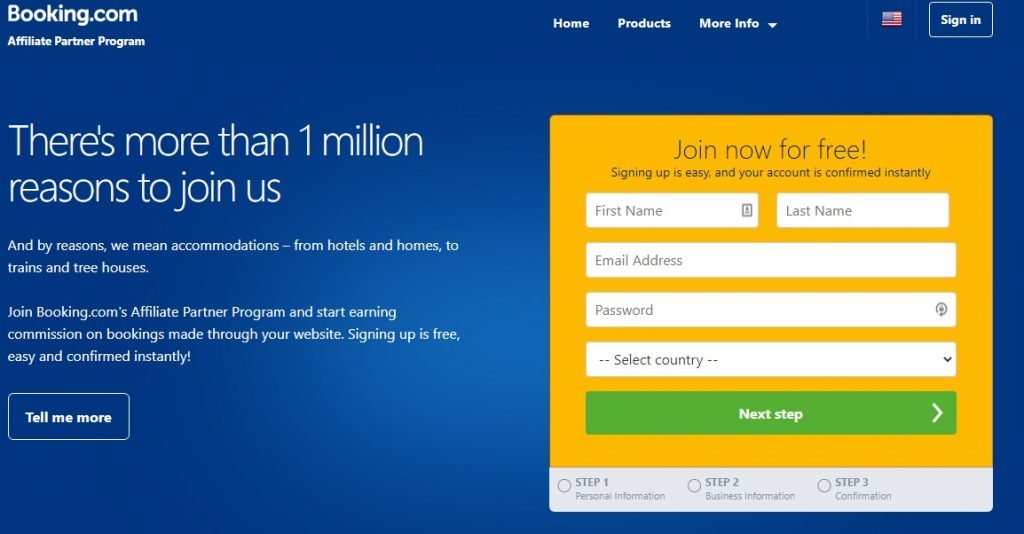
Booking.com is one of the largest travel platforms worldwide, making it an excellent affiliate option. As a travel blogger, you can link to hotels, guesthouses, and apartments and earn a commission every time your reader books through your referral. The best part? Booking.com is trusted globally, which increases your chances of conversions. Commissions typically range from 25% to 40% of Booking.com’s cut (not the total booking amount), and they provide easy-to-integrate widgets and search boxes.
2. Airbnb Associates Program
Airbnb’s Associates Program lets travel bloggers earn when they inspire bookings for homes or Airbnb Experiences. It’s ideal for bloggers who cover unique stays, digital nomad life, or local experiences. You can earn up to 25% commission on Airbnb’s fee. Their tools include deep links and curated content. While the approval process is selective, it’s a fantastic fit for bloggers with good engagement and travel-focused content.
3. TripAdvisor Affiliate Program (via CJ Affiliate)
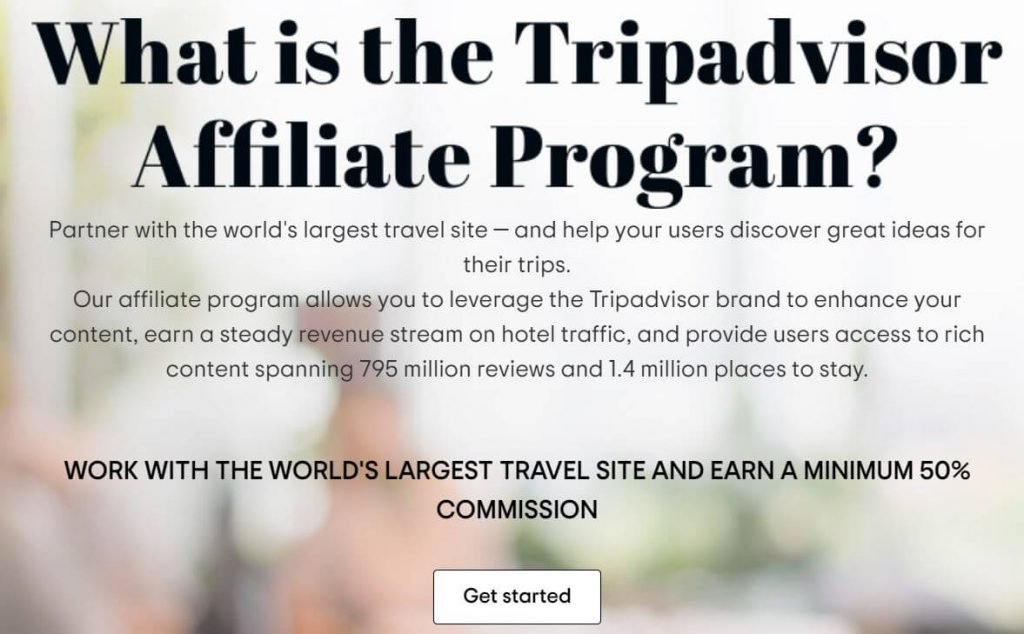
TripAdvisor is a trusted name for travel reviews and bookings. Through its affiliate program via CJ Affiliate, bloggers can earn revenue from clicks and bookings on hotels, attractions, and restaurants. What’s unique is that you get paid per click (PPC), not just on conversions, making it great for bloggers with high traffic. Their average commission is about 50% of the revenue share, depending on the booking type.
4. Skyscanner Affiliate Program
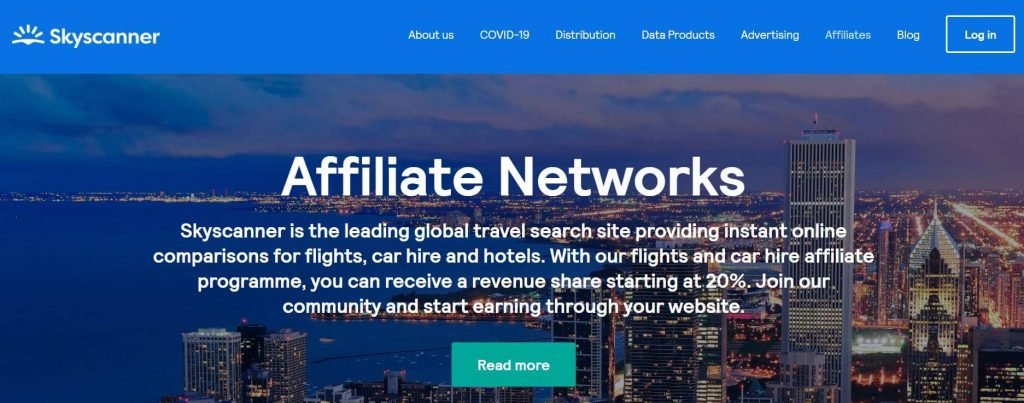
Skyscanner is a flight comparison website that also includes hotel and car hire options. As an affiliate, you can earn money by referring users to book flights or compare prices. Skyscanner offers a wide range of tools such as widgets, white-label solutions, and APIs. While commissions are modest, the brand’s reputation and ease of use make it a reliable choice for any travel content.
5. GetYourGuide Affiliate Program
GetYourGuide is a leading platform for booking tours, activities, and experiences around the world. Their affiliate program lets you earn up to 8% commission per booking. This is perfect for bloggers who love to recommend unique adventures like cooking classes, guided hikes, or city tours. Their dashboard provides analytics, link tracking, and marketing materials to boost your earnings.
6. Viator Affiliate Program
Owned by TripAdvisor, Viator is another powerful platform for booking experiences. With over 300,000 tours and activities, you’re bound to find content that matches your niche. The affiliate program offers up to 8% commission and provides robust marketing tools like banners and customizable widgets. It’s best for bloggers who create itinerary guides or location-specific posts.
7. Expedia Affiliate Program

Expedia’s affiliate program is hosted on the Expedia Affiliate Network (EAN). As one of the top online travel agencies, they offer flights, hotels, car rentals, and vacation packages. Commissions vary based on product but typically range between 2% and 6%. Expedia’s massive inventory and strong brand recognition can help increase conversions on your blog.
8. SafetyWing Affiliate Program
If you blog about digital nomad life, long-term travel, or working remotely, SafetyWing is a perfect fit. They offer travel medical insurance designed for nomads, and their affiliate program pays a recurring 10% commission. That means you earn as long as your referred user stays subscribed. It’s great for creating content around travel safety or health while abroad.
9. Travelpayouts Affiliate Network
Travelpayouts is an all-in-one platform that offers access to over 100 travel brands, including Agoda, Booking.com, and Kiwi.com. The advantage here is that you can manage multiple affiliate programs under one dashboard. Travelpayouts provides banners, widgets, and APIs. Commissions vary depending on the partner but typically range from 1% to 10%.
10. World Nomads Affiliate Program
World Nomads is one of the most trusted travel insurance providers. Their affiliate program offers up to 10% commission on travel insurance policies. It’s an ideal match for adventure bloggers or those covering remote destinations. World Nomads is also known for their ethical practices, making it a good option if your brand values trust and transparency.
11. Hostelworld Affiliate Program
If your audience is budget-conscious or backpacker-focused, Hostelworld is a solid option. Their platform specializes in hostel accommodation, and affiliates earn up to 50% of the booking fee. You’ll get access to text links, banners, and an API for deep integration. This is especially helpful for destination-specific hostel recommendations.
12. Intrepid Travel Affiliate Program
Intrepid Travel offers small group tours with a focus on responsible and sustainable tourism. Their affiliate program pays 4% to 10% commission on bookings, which can amount to a decent chunk since many tours are high-ticket. If you promote eco-conscious or adventure travel, this affiliate fits perfectly with your content.
13. G Adventures Affiliate Program
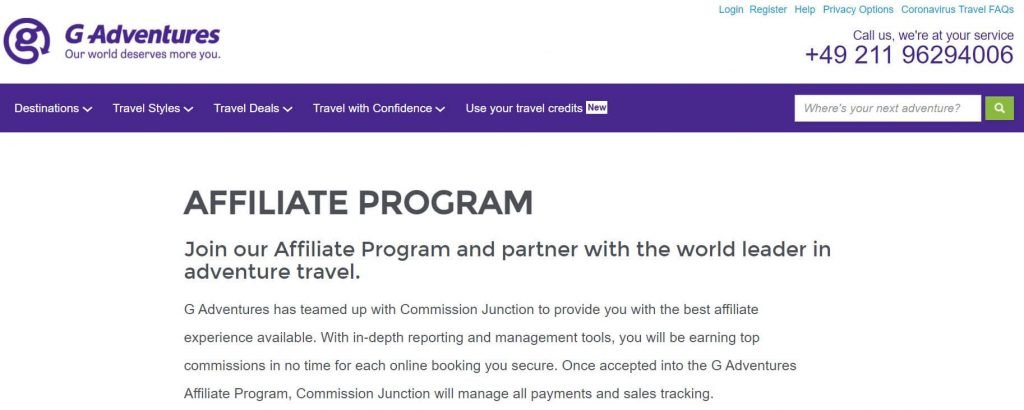
Like Intrepid, G Adventures provides sustainable small-group tours. Affiliates earn up to 6% commission, and with tour prices averaging over $1000, this can be lucrative. They offer excellent creative tools, booking widgets, and special deals you can share with your audience.
14. CityPass Affiliate Program
CityPass provides discounted tickets to top attractions in major U.S. cities. If you write about domestic travel in the U.S., this is a great way to offer value while earning up to 10% per sale. They provide clean, user-friendly tools and excellent customer support. This is perfect for family travel or city itinerary posts.
15. Agoda Affiliate Program
Agoda is popular in Asia for hotel and accommodation bookings. Their affiliate program pays up to 6% commission and provides deep links and custom search boxes. For bloggers focusing on Southeast Asia, this program is highly relevant and converts well thanks to Agoda’s competitive pricing.
16. Turo Affiliate Program
Turo is like Airbnb for cars—travelers can rent vehicles directly from locals. Their affiliate program pays up to $25 per booking, and sometimes more for new signups. This is a good choice if you write about U.S., Canadian, or European road trips and need car rental options to recommend.
17. Rentalcars.com Affiliate Program
Rentalcars.com, part of Booking Holdings, allows users to compare rental prices from major providers. Their program pays around 6% per booking and provides multilingual support and geo-targeting tools. It’s ideal for road trip content or travel itineraries that include car rentals.
18. Civitatis Affiliate Program
Civitatis specializes in Spanish-language travel experiences, though it has grown into a global platform. They offer 8% commission, multilingual tools, and a massive list of tours and guides. If you cater to Spanish-speaking audiences or blog in both English and Spanish, this is a smart affiliate option.
19. TrustedHousesitters Affiliate Program
This unique platform allows travelers to stay in people’s homes for free in exchange for pet sitting. Their affiliate program pays $25 per sale, making it a high-ticket option if you target long-term travelers, digital nomads, or slow travel enthusiasts. It’s great for content about budget travel, travel hacks, or alternative lodging options.
20. Sandals Resorts Affiliate Program
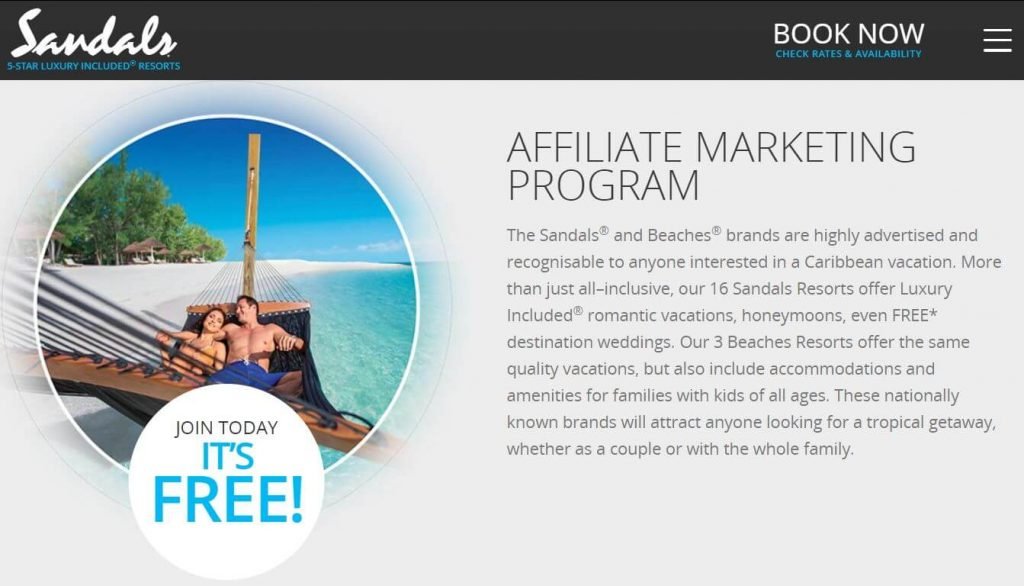
Sandals Resorts is a luxury, all-inclusive resort chain in the Caribbean. Their affiliate program offers commissions of up to 4% on high-ticket bookings. This is great if you focus on romantic getaways, honeymoon destinations, or luxury travel. They provide dedicated affiliate support, exclusive offers, and marketing materials.
21. TourRadar Affiliate Program
TourRadar offers multi-day tours worldwide and pays 6% commission per sale. The platform is easy to use, with tons of customizable widgets and banners. With trips ranging from $300 to several thousand dollars, even a few conversions a month can generate solid income. Ideal for those who create deep-dive itineraries or group travel content.
Comparison Table: Best Affiliate Programs for Travel Bloggers
| Program Name | Commission Rate | Best For | Cookie Duration | Promotion Tip |
|---|---|---|---|---|
| Booking.com | 25–40% of their cut | Hotel and accommodation content | Session-based | Embed direct hotel links in city travel guides |
| Airbnb Associates | Up to 25% | Unique stays, digital nomads | 28 days | Curate list posts like “Top Airbnbs in [Destination]” |
| TripAdvisor (via CJ) | PPC + Commission | Travel guides, attraction bookings | Session-based | Use in “Top Attractions in…” articles |
| Skyscanner | Varies | Flight deals and search tools | 30 days | Embed flight widgets in budget travel posts |
| GetYourGuide | Up to 8% | Tour and activity recommendations | 30 days | Link in “Best Tours in [City]” guides |
| Viator | Up to 8% | Experiences, tours, day trips | 30 days | Add to destination itinerary posts |
| Expedia | 2–6% | Full travel package recommendations | 7 days | Create package trip comparisons |
| SafetyWing | 10% recurring | Long-term travel & digital nomads | 365 days | Mention in travel insurance recommendation sections |
| Travelpayouts | 1–10% | All-in-one affiliate access | Varies | Use dashboard for multiple brand promotion |
| World Nomads | Up to 10% | Adventure and remote travel insurance | 60 days | Mention in travel safety or packing list posts |
| Hostelworld | Up to 50% of fee | Budget travelers and backpackers | 30 days | Add to “Best Hostels in…” type articles |
| Intrepid Travel | 4–10% | Sustainable, small-group travel | 90 days | Promote in ethical or eco-travel focused blogs |
| G Adventures | Up to 6% | Group and adventure travel | 90 days | Recommend for multi-day travel packages |
| CityPass | 10% | U.S. city travel and family guides | 30 days | Include in “City on a Budget” type posts |
| Agoda | Up to 6% | Asia-focused hotel bookings | 30 days | Insert hotel deals in itinerary-style posts |
| Turo | Up to $25 per book | Road trips in US, Canada, Europe | 7 days | Use in car rental comparison or driving trip guides |
| Rentalcars.com | ~6% | Car rental bookings globally | 30 days | Place widget or links in road trip posts |
| Civitatis | 8% | Spanish-language travel experiences | 30 days | Great for bilingual or Spain/LatAm focused content |
| TrustedHousesitters | $25 per signup | Budget, slow travel, pet lovers | 90 days | Include in alternative accommodation roundups |
| Sandals Resorts | Up to 4% | Luxury and honeymoon content | 30 days | Perfect for romantic getaway blogs |
| TourRadar | 6% | Multi-day, organized tours | 30 days | Link in comparison posts for guided tours |
Affiliate Programs vs Affiliate Networks: What’s the Difference?
As a travel blogger diving into affiliate marketing, you’ll come across two common terms: affiliate programs and affiliate networks. They may seem similar, but they serve different roles, and understanding the distinction can help you make better decisions when choosing how to monetize your content.
What is an Affiliate Program?
An affiliate program is run directly by a company or brand. It allows you to sign up and promote their specific services or products in exchange for a commission. These programs are often hosted on the company’s platform or through a third-party system.
Example:
- Booking.com Affiliate Partner Program is a standalone affiliate program.
- You sign up directly through Booking.com’s own portal.
- They provide tools like widgets, deep links, and reporting dashboards.
Pros:
- Often higher commission rates
- Better brand alignment and direct communication
- Custom tools specific to the brand
Cons:
- Managing multiple dashboards and payments can be time-consuming
- Limited to one brand at a time
What is an Affiliate Network?
An affiliate network acts as a middleman between you (the affiliate) and many different companies offering affiliate programs. Once you join a network, you can apply to multiple brands from one place, track earnings centrally, and get access to promotional tools across different verticals.
Example:
- CJ Affiliate, ShareASale, and Travelpayouts are popular affiliate networks.
- You can join TripAdvisor, Viator, Agoda, and more—all from a single dashboard.
Pros:
- Easy to manage multiple affiliate programs in one place
- Centralized payments and analytics
- Quick to test different brands
Cons:
- Commission rates may be slightly lower due to network fees
- Less customization or brand support
Which One Should You Use?
Both have their place in a travel blogger’s affiliate strategy.
- If you’re just starting, an affiliate network like Travelpayouts is a smart choice—it simplifies everything.
- If you have high traffic and want to form stronger relationships with specific brands, a direct affiliate program (like GetYourGuide or SafetyWing) could be more rewarding.
Pro Tip:
Many experienced travel bloggers combine both using affiliate networks for variety and flexibility, and direct programs for better commissions and personalized support.
How Do I Become a Travel Affiliate?
Becoming a travel affiliate is easier than most people think but success comes from doing it the right way. If you’re passionate about travel and already run a blog or strong social media presence, you’re halfway there. Here’s a step-by-step guide to help you start earning money with travel affiliate marketing.
1. Start with a Blog or Content Platform
The first step is having a place to share your affiliate links. This could be a travel blog, YouTube channel, or even a niche Instagram account. However, blogs are ideal because:
- Search engines can drive traffic long after you hit “publish.”
- You can insert affiliate links naturally into long-form content.
- You control the design and monetization options.
2. Pick a Travel Niche That Converts
Before signing up for affiliate programs, narrow your focus. Niching down helps you connect with a specific audience and recommend highly relevant products.
Popular travel niches that convert well:
- Solo female travel
- Digital nomad lifestyle
- Family travel
- Budget backpacking
- Luxury escapes
- RV/van life
- Adventure travel
Choosing a niche also helps you decide which affiliate programs best align with your audience’s needs.
3. Join Affiliate Programs or Networks
Once you have your content platform ready and niche defined, apply to affiliate programs that match your audience. You can start with:
- Direct programs like Booking.com or SafetyWing
- Affiliate networks like Travelpayouts or CJ Affiliate
Most applications ask for your website, niche, and promotional strategy. Be honest and clear—even if your site is new, programs often approve you if you show effort and alignment.
4. Create Helpful, Targeted Content
Now, the real magic happens content that helps your audience and includes your affiliate links. Aim to solve problems or answer questions your readers have, like:
- “Where to Stay in Istanbul on a Budget”
- “Best Travel Insurance for Digital Nomads”
- “Top Day Trips from Rome You Can Book Online”
5. Use SEO to Drive Free, Long-Term Traffic
Search engine optimization (SEO) is a must if you want consistent traffic. Learn basic SEO practices:
- Use keywords in your titles, headers, and URLs
- Write meta descriptions for each post
- Add internal links to keep readers on your site
- Optimize for mobile and speed
6. Disclose Affiliate Links (It’s the Law)
Being transparent builds trust with your audience. Always disclose when a post contains affiliate links. A simple sentence like:
This post contains affiliate links. If you purchase through these links, I may earn a commission at no extra cost to you.”
7. Track, Analyze, and Improve
Once your content is live, monitor which posts bring in traffic and commissions. Use:
- Google Analytics to track visitor behavior
- Affiliate dashboards to see what links are performing
- A/B testing headlines or layouts
8. Keep Learning and Stay Consistent
Affiliate marketing is not a one-time effort; it’s a long game. Join travel blogging communities, subscribe to affiliate marketing newsletters, and continue creating high-quality, helpful content.
The more value you give, the more trust you build, and that leads to more conversions.
Are Travel Affiliate Websites Profitable?
Yes, travel affiliate websites can be profitable, but the income varies widely based on traffic, niche, and content quality. New bloggers typically earn around $50 to $300 per month in their first 6–12 months, mainly from a few well-performing articles. Once your blog grows to 20,000–50,000 monthly pageviews, you can expect to earn anywhere from $500 to $2,000 per month through affiliate links—especially if you promote travel insurance, tours, hotels, and car rentals.
Established travel bloggers with 100,000+ monthly visits can earn $5,000 to $10,000+ per month just from affiliate marketing alone. Some top-tier bloggers even make $20,000 or more monthly, particularly when combining affiliate income with other revenue streams like ads, digital products, or sponsored posts. Like any business, growth takes time, but the income potential is very real if you’re consistent and strategic.
Final Thoughts
Affiliate marketing can be one of the most rewarding income streams for travel bloggers. The key is to choose programs that match your content style, resonate with your audience, and offer fair commission structures. Whether you’re writing about backpacking through Europe, road-tripping in the U.S., or digital nomad life in Southeast Asia, there’s an affiliate program that can align with your niche.
Start with 2–3 of the affiliate programs listed above, test their performance, and scale your efforts as your blog grows. With authentic recommendations and strategic content, you can earn while helping your audience travel smarter and safer.
Hi there. My name is Abbas Khan. I’m passionate about finding smart ways to save and make money from anywhere in the world.
Learning how to earn remotely and manage my finances gave me true freedom, and now I want to help you do the same.
Join me as I explore money-saving hacks, income ideas, and tips to build a flexible, location-independent lifestyle you’ll love.


2 thoughts on “21 Best Affiliate Programs for Travel Bloggers”